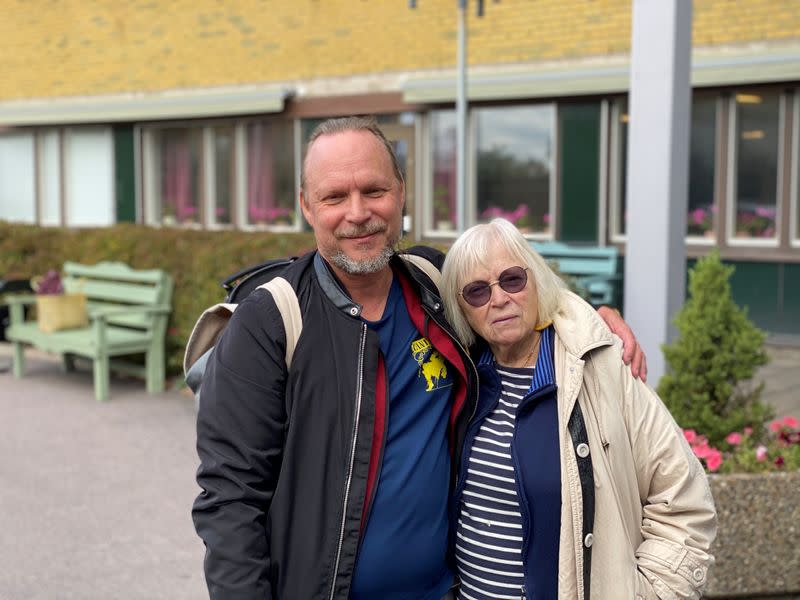Delight and worry as Sweden lifts pandemic ban on nursing home visits
By Johan Ahlander and Helena Soderpalm
GOTHENBURG, Sweden (Reuters) - Sweden ended a six-month ban on visits to nursing homes on Thursday, delighting residents and their relatives but also prompting fears of a return to the grim months of spring when COVID-19 caused thousands of deaths at care facilities.
Ingrid Bolander, 82, is itching to visit her husband Soren. He suffers from dementia and was admitted to a nursing home in Gothenburg, Sweden's second biggest city, during the summer.
The couple have been married for 60 years and, while they have been able to meet outdoors behind protective plastic barriers, they haven't been close in months.
"It's incredibly exciting," she said. "To be able to come into his room and see how he is doing and living."
About 70 residents live at the Graberget nursing home, which has managed the pandemic without a single COVID-19 case, a rarity in Sweden's big cities.
"It's a wonderful day," said Malin Roos, manager at Graberget. "It was an incredibly emotional feeling this morning to tear down the poster on the entrance that said 'no visits'."
The timing is awkward, however. Sweden recorded 752 new COVID-19 cases on Thursday, the biggest daily rise since June.
Anders Tegnell, Sweden's chief epidemiologist and the architect behind the country's soft-touch pandemic strategy, said lifting the ban entailed risks but needed to be weighed against the suffering lonely residents endure.
"It must be remembered that it's a right for those who live in nursing homes to receive visits. The nursing homes now have to ensure that visits can be made in a safe manner," he told a news conference.
EUROPEAN OUTLIER
The ban was one of only a few binding restrictions Sweden imposed during the pandemic. Most other measures are voluntary and focused on social distancing and good hygiene. Schools, restaurants and businesses have largely remained open.
COVID-19 deaths in Sweden have been many times higher than in neighbouring Nordic countries, and its strategy has been criticized at home and abroad.
But it also has supporters who say it has protected the economy from the worst of the pandemic. Although Sweden's export-dependent economy has taken a huge hit, it has fared much better than most of Europe.
The harshest criticism within Sweden has been reserved for its handling of the vulnerable.
During the spring many nursing homes lacked safety equipment and testing for staff was inadequate. The Public Health Agency estimates that around 90% of confirmed cases at nursing homes have been infected by staff.
Of Sweden's nearly 5,900 deaths, around 2,600 have occurred at nursing homes.
Yngve Gustafson, professor in geriatrics at Umea University and a long-time critic of Sweden's elderly care, blames cost savings and poor management for the number of deaths.
"Around half of the deaths (in nursing homes) are due to poor knowledge about safety gear. The other is about having given palliative care without a correct assessment," he said.
At Graberget nursing home, residents and staff are celebrating with an outdoor country music concert.
"We are still at war but we have won this battle," said manager Roos. "This is a big milestone and it's a huge reward that everyday life is starting to become a little more normal."
(Reporting by Johan Ahlander in Gothenburg and Helena Soderpalm in Stockholm; editing by Niklas Pollard and Mike Collett-White)

 Yahoo News
Yahoo News 



